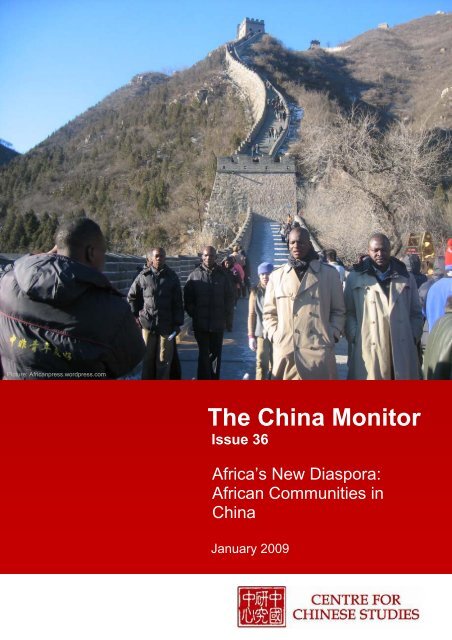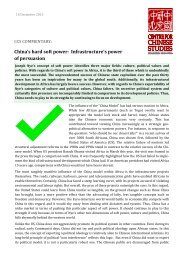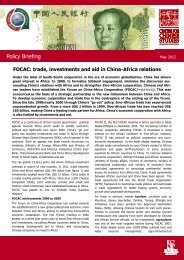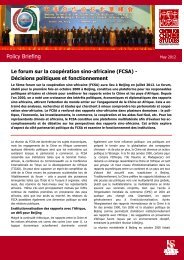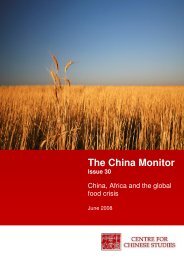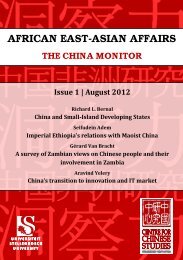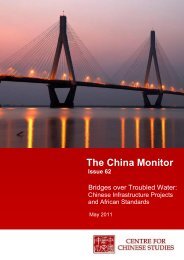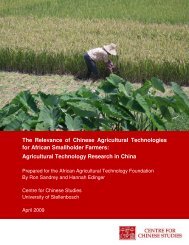The China Monitor - The Centre for Chinese Studies
The China Monitor - The Centre for Chinese Studies
The China Monitor - The Centre for Chinese Studies
Create successful ePaper yourself
Turn your PDF publications into a flip-book with our unique Google optimized e-Paper software.
<strong>The</strong> <strong>China</strong> <strong>Monitor</strong>January 2009EditorialA new body of research is being written on <strong>China</strong>’s engagement and growingpresence in Africa, but so little is known of the presence and role of Africansliving in <strong>China</strong>. <strong>The</strong> <strong>Centre</strong> <strong>for</strong> <strong>Chinese</strong> <strong>Studies</strong> seeks to tackle this subject ingreater depth in the coming months.Booming trade between <strong>China</strong> and Africa is also being driven by African tradersresident in <strong>China</strong> who have set up businesses in <strong>China</strong>’s major manufacturingand procurements centres – in particular in the cities of Guangzhou and Yiwu.<strong>China</strong>’s expanding exports to Africa are often assumed to be driven by tiedpurchasing of <strong>Chinese</strong> equipment by way of government-to-governmentinvestment deals or through the growing <strong>Chinese</strong> diaspora network in Africa.This is clearly not entirely the case.Most Africans in <strong>China</strong> are from either West Africa or the Maghreb region. <strong>The</strong><strong>Chinese</strong> government’s training programs <strong>for</strong> African civil servants are alsoboosting the numbers – the African community in <strong>China</strong> may now even amountto a quarter of a million. <strong>The</strong>se are indeed sizeable and even surprisingnumbers. African private entrepreneurs are perhaps playing a greater role in<strong>China</strong>-Africa commerce than previously known. <strong>China</strong>-Africa relations are notsolely the domain of politicians after all!Dr Martyn J. DaviesExecutive Director, <strong>Centre</strong> <strong>for</strong> <strong>Chinese</strong> <strong>Studies</strong>© <strong>Centre</strong> <strong>for</strong> <strong>Chinese</strong> <strong>Studies</strong>, University of Stellenbosch; All Rights Reserved3
<strong>The</strong> <strong>China</strong> <strong>Monitor</strong>January 2009Policy Watch<strong>The</strong> African Presence in Contemporary <strong>China</strong>By Dr. Adams Bodomo,Associate Professor of Linguistics & African <strong>Studies</strong>University of Hong Kong“While it has been estimatedthat some one million<strong>Chinese</strong> are living in Africa,there are only about aquarter of that number in<strong>China</strong>.”It is now almost a quarter of a Century ago since Runoko Rashidi's startling booktitled <strong>The</strong> African Presence in Early Asia appeared. Within it James Brunson'sarticle “<strong>The</strong> African presence in early <strong>China</strong>” details possible African contributionsto the <strong>Chinese</strong> race, history and early civilization.Little did Runoko Rashidi and the other authors in that volume’s collection ofarticles know that 25 years later we would be dealing with empiricallyincontrovertible cases of real and concurrent African migrations to contemporary<strong>China</strong> and <strong>Chinese</strong> migrations to contemporary Africa.“<strong>The</strong> DRC may still beplagued by disease andabsolute poverty and in theEastern parts ravaged by<strong>The</strong> author outside an African shoppingmall in <strong>China</strong>.Photo: Adams Bodomowar, but its mining sector isbooming.”While much more is known about the <strong>Chinese</strong> presence in contemporary Africa,little is known of the reverse of the coin. This short article seeks to outline theAfrican presence in <strong>China</strong>. How many Africans are in <strong>China</strong>? Which Africancountries and regions are mostly represented among these migrants? Where in<strong>China</strong> are they found? Why do they come to <strong>China</strong> and how are they received?<strong>The</strong>se are some of the questions we seek to answer.While it has been estimated that some one million <strong>Chinese</strong> are living in Africa,there are only about a quarter of that number of Africans in <strong>China</strong>, with some 100,000 in Guangzhou alone, and the rest distributed in cities such as Hong Kong andMacau in southern coastal cities and Yiwu, Shanghai, Beijing and other mid- andnorthern <strong>Chinese</strong> cities.Africans in <strong>China</strong> may be arranged into several categories: diplomats and otherofficial representations from Africa in <strong>China</strong>; African students, studying both onshort and long term basis in <strong>China</strong>; African professionals from continental Africaand from the African diaspora living and working in <strong>China</strong>; and finally, Africantraders, both on short and long term residence in <strong>China</strong>.<strong>The</strong> last group is by far the largest. As part of the golden era of <strong>Chinese</strong>-Africanrelations, many African traders began to move to <strong>China</strong> in search of cheapmanufactured goods which they could buy and ship back home to Africa to sell <strong>for</strong>© <strong>Centre</strong> <strong>for</strong> <strong>Chinese</strong> <strong>Studies</strong>, University of Stellenbosch; All Rights Reserved4
<strong>The</strong> <strong>China</strong> <strong>Monitor</strong>January 2009profit. While this process began with Africans who studied in <strong>China</strong> and remainedthere to do business, an obstacle appeared during the Asian financial crisis of1997. Many African traders in neighbouring Southeast Asian countries such asThailand, Malaysia, and Indonesia that were more hard-hit by the crisis simplymoved into <strong>China</strong> to continue their trade between Africa and Asia.“In Hong Kong, there aremore Africans of southernAfrican origins, especiallyWhite Africans. <strong>The</strong>Southern African Communityin Hong Kong, comprisingmostly white South Africans,boasts about 200 members.”Guangzhou, capital of Guangdong province, is the richest province in <strong>China</strong>, alsoknown as the world’s factory. Here, more Africans can be found than in any otherpart of <strong>China</strong>. Indeed a whole section of the city has been designated “ChocolateCity” because of the large Africans presence there whose skins are seen to looklike chocolate by the <strong>Chinese</strong>. In my paper titled “<strong>The</strong> African trading communityin Guangzhou: An emerging bridge <strong>for</strong> Africa - <strong>China</strong> relations,” presented at the<strong>China</strong> Quarterly Workshop, School of African and Oriental <strong>Studies</strong>, University ofLondon, September 25 - 28, 2008, which is based on field research I did amongthis African population, 77% of respondents were from Nigeria, and furthersizeable numbers of respondents were from countries such as Guinea, Mali,Ghana, Senegal, Cameroon, and the Democratic Republic of Congo. On thewhole more West Africans are found in the African population in Guangzhou.<strong>The</strong> situation is different in Yiwu, a city in Zhejiang province, where there is apreponderance of people from the Maghreb region, particularly from countriessuch as Mauritania, Morocco, Egypt, Tunisia, Sudan, and Algeria. Yiwu, termedthe world’s largest commodities city, is a new metropolis created purposely bythe <strong>Chinese</strong> authorities as a centre <strong>for</strong> sourcing commodities. Arab Africans fromthe Maghreb, especially those who studied in <strong>China</strong>, and speak the <strong>Chinese</strong>language fluently, having remained after their study programmes, control thisAmateur football provides a welcomesocial activity <strong>for</strong> expatriate Africans.Photo: Adams Bodomobusiness, however a growing population of black Africans are beginning topopulate Yiwu, as I found out during a preliminary field survey there in December2008 during which time I conducted a participant-observation at a large mosquefrequented by African moslems among others.In Hong Kong, there are more Africans of southern African origins, especiallywhite Africans. <strong>The</strong> Southern African community in Hong Kong, comprisingmostly white South Africans, boasts about 200 members. But this group ofAfricans is not easy to discern in the city, except on their Rugby Sevensweekend once a year when many South African whites wear their South AfricanSpringboks T-shirts. <strong>The</strong>re is a sizeable population of black Africans in- andaround the Chung King Mansions situated in Tsim Sha Tsui, Kowloon, which is abusy shopping area <strong>for</strong> tourists in Hong Kong. This population is furtherdescribed in my 2008 article “An Emerging African-<strong>Chinese</strong> Community in HongKong: <strong>The</strong> Case of Tsim Sha Tsui's Chungking Mansions.”© <strong>Centre</strong> <strong>for</strong> <strong>Chinese</strong> <strong>Studies</strong>, University of Stellenbosch; All Rights Reserved5
<strong>The</strong> <strong>China</strong> <strong>Monitor</strong>January 2009“Northern <strong>Chinese</strong> cities havea mix bag of Africans. InBeijing, being the capital of<strong>China</strong>, there is apreponderance of Africanswho officially represent theircountries in the embassies.”Macau, a <strong>for</strong>mer Portuguese colony at the mouth of the Pearl River, also has asizeable African population of about 300, mostly from <strong>for</strong>mer Portuguese coloniessuch as Angola and Mozambique. Northern <strong>Chinese</strong> cities host a mixed bag ofAfricans. In Beijing, the capital of <strong>China</strong>, there is a preponderance of Africans whoofficially represent their countries within embassies and other internationalorganizations. A sizeable number of African students live in the capital but also atAfrican <strong>Studies</strong> <strong>Centre</strong>s like that in Zhejian Normal University, Hangzhou. InShanghai, being the most cosmopolitan city in <strong>China</strong>, all these categories ofAfricans can be found.How are these Africans received in <strong>China</strong>? Fellow Africans I have interacted with,especially in the course of my field research <strong>for</strong> my <strong>for</strong>thcoming book, Africans in<strong>China</strong>, report cases of racism and other kinds of discrimination, which may stemfrom linguistic and cultural misunderstanding. But this is not an entrenchedsystematic practice. On the contrary, the African in <strong>China</strong> can sometimes be theobject of positive curiosity as there are still many <strong>Chinese</strong> who have not come intoclose contact with Africans, even if they have seen them on news media.<strong>The</strong> author visits the famed Pilipilirestaurant in Beijing, a popular venue <strong>for</strong>expatriate Africans in the city.Photo: Adams BodomoAfrican migration in contemporary <strong>China</strong> represents an important dimension in theburgeoning relationship between Africa and <strong>China</strong>, as is the case with <strong>Chinese</strong>migration to contemporary Africa. Both the <strong>Chinese</strong> government, on the one hand,and African governments, on the other, ought thus to encourage and facilitate thepeaceful mingling of Africans and <strong>Chinese</strong>, as Africans in <strong>China</strong> and <strong>Chinese</strong> inAfrica can serve as cultural and economic bridges to the further development ofAfrica-<strong>China</strong> relations.HKU introduces new programme in African <strong>Studies</strong> – the first ofits kind in Hong Kong and Southern <strong>China</strong><strong>The</strong> University of Hong Kong (HKU) has introduced a new Bachelor ofArts (BA) Programme in African <strong>Studies</strong> at the School of Humanities,Faculty of Arts. This is the first of its kind in Hong Kong and southern<strong>China</strong>.Dr. Adams Bodomo isAssociate Professor ofLinguistics and African<strong>Studies</strong> at the Universityof Hong Kong and aCoordinator of theuniversity’s African<strong>Studies</strong> Programme.Students from all Faculties can take individual courses <strong>for</strong> credit inFoundations in African <strong>Studies</strong>, Introduction to African Linguistics,Swahili Structure and Universal Grammar, Proficiency Course in anAfrican Language, African Music, Arts of West, Central and SouthernAfrica, Africa-<strong>China</strong> Relations, and Educational Field Trip to Africa toobtain a BA Minor in African <strong>Studies</strong>.For more in<strong>for</strong>mation about the programme, please consult the African<strong>Studies</strong> website at: http://www.hku.hk/African<strong>Studies</strong> or consult ourUndergraduate Admissions staff by email: africa@hkucc.hku.hk© <strong>Centre</strong> <strong>for</strong> <strong>Chinese</strong> <strong>Studies</strong>, University of Stellenbosch; All Rights Reserved6
<strong>The</strong> <strong>China</strong> <strong>Monitor</strong>January 2009CommentaryHosting Africans – What are <strong>China</strong>’s Concerns,If any?By Dr. Liu Haifang,Associate Professor, Institute <strong>for</strong> West Asianand African <strong>Studies</strong>, Beijing“<strong>China</strong>’s demand <strong>for</strong>resources has thusunderwritten African growth inrecent years.”Towards the end of 2008, amid the severe winter of the global financial crisis, thepresence of thousands of homesick African students was testing <strong>China</strong>’shospitality. As a responsible power, as it claims to have become in recent years,is <strong>China</strong> ready to host ever increasing African students, emerging businessmenand traders, besides the already resident diplomatic and commercial Africanexpatriate population?An observer might reply positively, if he or she had visited the Pilipili Africanrestaurant on the chilly night of Dec. 20th, 2008 (be<strong>for</strong>e 2008, this was the onlyAfrican restaurant in Beijing, owned by a <strong>Chinese</strong> entrepreneur who is also theCEO of Holley-Cotec Pharmaceuticals Co, Ltd; the influential <strong>Chinese</strong> medicalcompany working in Africa producing anti-malaria medication), where a festiveChristmas celebration <strong>for</strong> overseas African students organized by <strong>China</strong>-AfricaYouth Club (website: http://www.cayc.org.cn/) was taking place. This wholly nonprofitclub was founded in 2007 by the director of the Liaison Division of <strong>China</strong>-Photo: Business South AfricaAfrica Business Council, which, as a non-governmental entrepreneurs’association among other private sectors in <strong>China</strong> only generally becomingprominent in recent years, was established in 2005. <strong>The</strong> founder of the Africanstudents club, nicknamed “big brother of Africans” spoke eloquently about theoriginal idea of creating the club: “When communicating with African students, Iunderstand they need such an organization to make friends, to sit together tohave a feeling of family, especially during holiday seasons,” he said. Though noAfrican student pays any membership fees, membership brings very luxuriousprivileges, such as touring in <strong>China</strong> both <strong>for</strong> sightseeing and visiting successfulenterprises in other cities, not to mention celebrating special festivals or otherdaily cultural exchange programs.An event as small as a non-profit organization’s Christmas party <strong>for</strong> Africanexpatriates might be a drop of water in a larger ocean of <strong>Chinese</strong> readiness tohost Africans in the PRC. For instance, together with human resources totalling15,000 immigrant Africans from various ranks coming to be trained in <strong>China</strong>,there are increased intakes of new African students from 2000 to 4000 and theannual scholarship <strong>for</strong> African students has been increased – these© <strong>Centre</strong> <strong>for</strong> <strong>Chinese</strong> <strong>Studies</strong>, University of Stellenbosch; All Rights Reserved7
<strong>The</strong> <strong>China</strong> <strong>Monitor</strong>January 2009developments the result of one of the eight commitments announced during theSino-African Summit in 2006. One should note however that not all African studentshave full support from the <strong>Chinese</strong> government and that many African youths cometo <strong>China</strong> via their own resources, such as one Nigerian encountered by the author ofthis article, working on an MBA master program at Peking University who came toexplore the various possibilities <strong>China</strong> might present him – opportunities that mightpresent themselves in the developed world.“<strong>The</strong> non-governmentalcultural organizationestablished <strong>for</strong> Africanstudents functions as a richresource <strong>for</strong> business, thoughit may only be useful inseveral years’ time.”<strong>The</strong> question remains, what can companies expect from donating money <strong>for</strong>operating this club and supporting the club members to travel, if not just a token oftheir sympathy <strong>for</strong> African students in <strong>China</strong>? At the Pilipili Christmas party, as moreand more businessmen and entrepreneurs entered the restaurant and joined theongoing conversations, their expectations from the Youth Club became ratherexplicit: they are looking to some of African students to take advantage of their‘special backgrounds’ to promote business, among those coming from family ofhigher-rank positions in their own countries, or according to their particular talentsrespectively, to become agents to bridge relations with their African counterparts.<strong>The</strong>re have been some successful cases, such as one Cameroonian graduatingfrom Shanghai University of Finance and Economics, who is now ChiefRepresentative in Africa <strong>for</strong> a famous fertilizer company based in Guang xiAutonomous Region.To assist in these ends, the Youth Club has previously invited overseas studentmanagers from many universities (to aid human resource provision), as well as manyAfrican alumni now working <strong>for</strong> <strong>Chinese</strong> companies back and <strong>for</strong>th between <strong>China</strong>and Africa, and also companies that have business in Africa that are seeking, orhave obtained such support, such as the newly established privately aggregated<strong>China</strong>-Africa Development Fund.<strong>The</strong> Pili Pili African restaurant in Beijing.Photo: Flickr.com<strong>The</strong> non-governmental cultural organization established <strong>for</strong> African studentsfunctions as a rich resource <strong>for</strong> business, though it may only be useful in severalyears’ time. It is however regarded as a cultural home <strong>for</strong> most of the interviewedAfrican students who had joined the club. Just two days ahead of the Christmascelebration at Pilipili restaurant, the <strong>China</strong>-Africa Business Council organized a<strong>for</strong>um on Strategy of <strong>China</strong>-Africa Business Cooperation under the Global FinancialCrisis, participated in by <strong>Chinese</strong> entrepreneurs, scholars, representatives of Africanbanks (such as Ecobank, BMCE Bank), DFID <strong>China</strong>, <strong>Chinese</strong> and African media,etc. During the Forum, a consensus emerged among those <strong>Chinese</strong> entrepreneurswho had stayed in Africa <strong>for</strong> a while: cultural engagement was a commonly identifiedneed in order to create strategic economic relations with Africans. Many reportedeven collecting thousands of pieces of African artworks to carry back to <strong>China</strong>. <strong>The</strong>y© <strong>Centre</strong> <strong>for</strong> <strong>Chinese</strong> <strong>Studies</strong>, University of Stellenbosch; All Rights Reserved8
<strong>The</strong> <strong>China</strong> <strong>Monitor</strong>January 2009bring the same successful philosophy back to <strong>China</strong> and practise it through the club,the restaurant and the Business Council respectively.Concurrently, what about those emerging African businessmen, traders and theiremployees living in various sized communities in some Southern <strong>Chinese</strong> cities?<strong>The</strong>y represent the other much larger portion of Africa’s Diaspora into <strong>China</strong>. Dothey, coming often from rather poor backgrounds, and many of whom are illiterate,have the same <strong>for</strong>tune as their fellow African expatriates----those college studentswhom the <strong>Chinese</strong> used to identify as “persons specially favoured by Heaven”? Is<strong>China</strong> concerned about these many thousands of expatriate African traders?<strong>The</strong> answer is <strong>for</strong>tunately not as much as in many European countries whereimmigrants are usually made out as scapegoats <strong>for</strong> many domestic problems,especially in the face of economic downturn caused by the global crisis. Despite<strong>China</strong>’s close engagement with the global economy and it’s shifting <strong>for</strong>tunes, thevoice of anti-Africanism towards those emerging African businessmen, traders andtheir African helpers has not been heard yet. In fact, these Africans are more likelyregarded optimistically as business partners--- however, is business enough?“Researching “Africans in<strong>China</strong>” on the <strong>China</strong> NationalKnowledge Infrastructure(CNKI), the most authoritativeand inclusive online databasein <strong>China</strong>, even in <strong>Chinese</strong>,produces not a single result.”Researching “Africans in <strong>China</strong>” on the <strong>China</strong> National Knowledge Infrastructure(CNKI), the most authoritative and inclusive online database in <strong>China</strong>, even in<strong>Chinese</strong>, produces not a single result. Further, news or reportage about Africans viaa search using keyword “African” can be received, yet even with this not as manyresults emerge. Despite a dearth of academic articles, one emerged; a conferencepaper by a Ph.D student from Zhongshan University investigating an Africancommunity in Guangzhou from an Urban <strong>Studies</strong> perspective. Among the few nonacademicarticles in <strong>Chinese</strong>, some gave observation to the emerging “chocolatecity, Guangzhou,” while others described the lively Pilipili African Restaurant with atitle of “To feel Africa in Beijing.”Quite at odds with the general ignorance of African activity in <strong>China</strong>, “illegalimmigrant Africans” has become a popular search term in the <strong>Chinese</strong> media since2006. In a survey published by International Herald Leader, a newspaper producedby the Xinhua News Agency, it was pointed out that most of these illegal immigrantAfricans come with papers, but stay and “evaporate” in due time, and, with manycoming from poor backgrounds, they come to <strong>China</strong> only <strong>for</strong> to earn money workingAfricans feature poorly as a searchcriterion on <strong>Chinese</strong> databases.Photo: therawfeed.comin African business’s <strong>Chinese</strong> branches in Guangdong or Zhejiang. This finding waswelcomed by some civil servants within the Ministry of Civil Affairs and Ministry ofSecurity, and in some reports circulated within the Ministry, who thus appealed <strong>for</strong>the government to realize the urgency of tightening the management of expatriateAfricans in <strong>China</strong> generally.© <strong>Centre</strong> <strong>for</strong> <strong>Chinese</strong> <strong>Studies</strong>, University of Stellenbosch; All Rights Reserved9
<strong>The</strong> <strong>China</strong> <strong>Monitor</strong>January 2009All this literature apparently reveals the presence of large numbers of African tradersand their African workers in <strong>China</strong> as a relatively new topic; yet along with thisquickly emerging trend, this output has also raised awareness among both civiliansand the government in terms of how to better manage the presence and growth ofthese African communities. Many traders have commented that what concernedthem greatly was their visa: they have to leave <strong>China</strong> after between one to sixmonths in order to reapply to enter it, which is naturally a costly and time-consumingprocess. <strong>The</strong> complications of the <strong>Chinese</strong> visa system result in some Africansbecoming illegal immigrants. At least increasing number of immigrant Africans hasled some <strong>Chinese</strong> to raise awareness in government circles of the growing problemof illegal African immigration and the need to monitor African communities moreclosely, with an eye towards finding appropriate solutions that balance <strong>China</strong>’sgrowing concerns of security and its openness to business.“<strong>China</strong>’s recent turn ofpolicies towards ‘bailing out’its economy should notdistract from the nationalneed to alter so-called ‘exportoriented’ modes of thought.”<strong>China</strong>’s recent turn of policies towards ‘bailing out’ its economy and industries inorder to enhance domestic demand should not distract from the national need toalter so-called ‘export oriented’ modes of thought, alongside popular psychologicalpreferences <strong>for</strong> ‘exotic’ or <strong>for</strong>eign goods and tastes--- both of which are trends thatwill take time to trans<strong>for</strong>m, given the deep seated pathology of <strong>China</strong>’s national selfconfidencewhich has been mending since the mid-19 th Century. <strong>China</strong> needs time tostimulate its domestic consumption, and in the meantime it will still need reliablemarkets with which to trade.Africa has been less immediately and directly affected by the financial crisis than theWest; this means that people who know how to improve Sino-African trade and canbring good business connections and advice in improving relations in <strong>China</strong> will beeven more welcome than usual. On the other hand, many African traders that runsuccessful wholesale businesses between <strong>Chinese</strong> companies and African retailers(on being interviewed in November 2008) do not believe the global financial crisis<strong>China</strong> is attempting to revive its flaggingeconomy by stimulating domesticdemand.Photo: <strong>The</strong>sunsfinancialdiary.comhas influenced their business in <strong>China</strong> too much. According to them, volumes ofgoods moved are likely not to shift much, and small retailers are not frequenting thewholesalers as much recently; not because of the global crisis, but more likely due toDr. Liu Haifang is an AssociateProfessor at the Institute ofWest Asian and African <strong>Studies</strong>at the <strong>Chinese</strong> Academy ofSocial Sciences in Beijing. Sheis an Angola specialist and is anoted analyst on Sino-Africanrelations with an interest insocial and culturalperspectives.the Christmas season.© <strong>Centre</strong> <strong>for</strong> <strong>Chinese</strong> <strong>Studies</strong>, University of Stellenbosch; All Rights Reserved10
<strong>The</strong> <strong>China</strong> <strong>Monitor</strong>January 2009Business Briefs<strong>The</strong> Business Briefs section summarises key events regarding <strong>China</strong>’s economy during the month of October<strong>China</strong> aims to increase coal production 30 % by2015 <strong>China</strong> is aiming to increase its coal production byabout 30 % by 2015 to meet its energy needs, thegovernment has announced in a move likely to fuelconcerns over global warming. Beijing plans toincrease annual output to more than 3.3 billion tonnesby 2015. That is up from the 2.54 billion tonnes iiproduced in 2007,according to theLand andResourcesministry. <strong>China</strong>began building fourstrategic oilreserve facilities onits east coast thisdecade, and two ofthese are now inMiningweekly.comoperation.<strong>China</strong> joins exclusive coal-to-liquid club<strong>China</strong>’s first coal-to-liquid plant is up and running,according to a new statement from its owner. ShenhuaGroup’s Inner Mongolia plant apparently startedturning coal into fuels and chemicals on December 30.Only South Africa also converts coal to oil. Last yearthe <strong>Chinese</strong> government issued a moratorium on newcoal to liquid facilities, but allowed the Shenhua Groupto build its Inner Mongolia plant and continue a venturewith South Africa’s Sasol company. Energy expertsPlatts say the plant currently produces around a millionbarrels of oil a year, with plans to ramp up to 20 millionover 2012-2015 and 100 million by 2020.<strong>China</strong> topsworld in Internetusers<strong>China</strong> surpassedthe United Statesin 2008 as theworld's top userGuardian.co.ukof the Internet,according to agovernment-backed research group. Nearly 91 % of<strong>China</strong>'s Internet users are surfing the Web with abroadband connection. <strong>The</strong> number of Web surfers inthe country grew by nearly 42 % to 298 million,according to the <strong>China</strong> Internet Network In<strong>for</strong>mationCenter's January report. And there's plenty of room <strong>for</strong>growth, as only about 1 in every 4 <strong>Chinese</strong> hasInternet access.<strong>China</strong>’s 2008 FDI Rises to US$92.4 BillionAn official from <strong>China</strong>’s Commerce Ministry announcedthat the country attracted US$92.4 billion worth of<strong>for</strong>eign direct investment in 2008, a 23.6 % increasefrom 2007 figures. Commerce Ministry spokesmanYao Jian reported that in December FDI inflowsamounted to US$6 billion while the cumulative total <strong>for</strong>the previous 11 months was US$86.4 billion.December FDI inflow slowed by 5.7 % to US$5.98billion compared to figures from a year earlier.<strong>China</strong> well placed to withstand global financialcrisis <strong>China</strong> is well placed among world emergingeconomies to weather the global economic downturnthat has begun to infect many developing countries,Alex Patelis, head of international economics at MerrillLynch, told Xinhua News in a recent written interview.With a high level of reserves, room <strong>for</strong> policy easing,strong savings rate and low leverage, <strong>China</strong>'seconomy ishealthy enough towithstand the<strong>for</strong>thcomingBloombergexternal risks asthe world'semergingeconomies see asignificant plungein equity andcurrency markets.<strong>China</strong> Passes Germany to Become Third-BiggestEconomy <strong>China</strong>’s economy overtook Germany’s in2007 to become the world’s third largest, underscoringthe nation’s increasing economic and political clout.Gross domestic product expanded 13 % from a yearearlier, more than a previous estimate of 11.9 %, toUS$3.38 trillion, the statistics bureau said on its Website. That topped Germany’s US$3.32 trillion, usingaverage exchange rates <strong>for</strong> 2007. “This number is justone more piece of evidence that <strong>China</strong> is one of themost important players on the global stage,” saidHuang Yiping, chief Asia economist at Citigroup Inc. inHong Kong.<strong>China</strong> GDP Growth May Cool to Slowest Pace in 7Years <strong>China</strong>’s economy may have expanded at theslowest pace in seven years in the fourth quarter asexports collapsed, adding to pressure <strong>for</strong> morestimulus measures and undermining growth acrossAsia. Gross domestic product grew 6.8 % from a yearearlier, according to the median estimate of 12economists surveyed by Bloomberg News, down from9 % in the previous three months.© <strong>Centre</strong> <strong>for</strong> <strong>Chinese</strong> <strong>Studies</strong>, University of Stellenbosch; All Rights Reserved11
<strong>The</strong> <strong>China</strong> <strong>Monitor</strong>January 2009<strong>China</strong> Consolidating Position as World No.1 GoldProducer <strong>China</strong>'s Ministry of Industry and In<strong>for</strong>mationTechnology has released figures <strong>for</strong> the country's goldoutput in November showing that production <strong>for</strong> theyear to end-November reached 246.51 tonnes. This isup only 2.14 % fromthe figure <strong>for</strong> the first11 months of 2008 -the year in which<strong>China</strong>'s goldproduction exceededthat of South Africa<strong>for</strong> the first time,making it the world's Smithsoniantop producer.<strong>China</strong> to expand its military reach<strong>China</strong> has said it plans to step up the modernisation ofits armed <strong>for</strong>ces, expanding the military's global reach,but at the same time calling on the incoming USadministration to improve military relations betweenthe two countries. A government policy report,released recently, said <strong>China</strong>'s overall securitysituation had improved but that <strong>China</strong>'s armed <strong>for</strong>cesneeded to improve to protect <strong>Chinese</strong> economicinterests around the world.<strong>China</strong> cuts fuelprices <strong>for</strong> firsttime in twoyears<strong>China</strong> cutdomestic fuelprices in January<strong>for</strong> the first timein almost twoyears as itManagingthedragon.comrevamps its regulated pricing regime, passing along ashare of oil's over US$100 slump to help reviveflagging economic growth. Crude oil gainedmoderately after Beijing announced a 14 % cut inrefinery gate gasoline prices and 18 % drop in dieselprices, plus a nearly one-third cut in jet fuel. <strong>The</strong> cutswere not unexpected after <strong>China</strong> announced lastmonth that it would push ahead a long-stalled ef<strong>for</strong>t toallow its domestic prices to fluctuate in line with theglobal market.<strong>China</strong>-Taiwan start direct transport, postal service<strong>China</strong> and Taiwan began direct air, sea transport andpostal services, the latest step to further improve thestrained ties between the two rivals. <strong>The</strong> move marksan end to the practice that air and sea transport as wellas mail between the mainland and Taiwan had to bererouted. Direct shipping, transport and postal servicesacross the Taiwan Strait also commenced. This is thefirst time direct flights have been conducted betweenthe two countries since the <strong>Chinese</strong> civil war in 1949.CNOOC to increase crude, gas production<strong>China</strong>'s top offshore oil and gas producer CNOOC Ltd.plans to lift its 2009 crude and gas production by 16 %to 18 %, as some significant projects are expected tocome online this year. Total production will be 225million to 231 million barrels of oil equivalent comparedwith the estimated production of 194 million to 196million BOE <strong>for</strong> 2008, the Beijing-based company saidin a statement.Death Sentences in <strong>Chinese</strong> Milk Case<strong>Chinese</strong> courts sentenced two men to death <strong>for</strong>endangering public safety in a tainted-milk scandal thatkilled at least six children, according to <strong>Chinese</strong> staterunnews media. Three other defendants, including atop dairy company executive, were sentenced to life inprison. Another defendant received a suspended deathsentence, and 15others were givenprison terms from 2 to15 years. <strong>The</strong>sentences were thefirst to be handeddown in one of theworst food safetyOurworldfoundation.org.uk scandals in <strong>China</strong> indecades. <strong>The</strong>scandals erupted in September 2008, prompting aglobal recall of <strong>Chinese</strong>-made dairy products, shakingconsumer confidence and devastating the nation’sdairy industry.<strong>China</strong>'s energy saving a silver lining to economicgloom Government data showed that <strong>China</strong> met anunofficial energy-saving target <strong>for</strong> the first time in 2008,as a serious economic slowdown succeeded whereyears of exhortations from the country's leaders failed.<strong>The</strong> amount of energy used to generate each dollar ofnational income fell 4.2 % last year, accelerating froma 3.7 % fall the previous year as factories closed or cutback production across the country's manufacturingheartland. Heavy industrial and manufacturing sectorshave been worst hit by the crisis, nudging the country'spattern of growth toward the service and retail sectorsin a way that, at least temporarily, dovetails withBeijing's plans <strong>for</strong> cleaner growth.<strong>China</strong> plays maritime chess<strong>China</strong>, undergirding its larger geostrategic motives,says it is "seriously considering" adding an aircraftcarrier to its navy fleet — a symbol of "a nation'scomprehensive power," as a military spokesperson putit. <strong>The</strong> start of <strong>Chinese</strong> patrols in the pirate-infestedGulf of Aden is intended to extend <strong>China</strong>'s naval roleand presence far from its shores while demonstrating,under United Nations rules of engagement, a capabilityto conduct complex operations in distant waters.© <strong>Centre</strong> <strong>for</strong> <strong>Chinese</strong> <strong>Studies</strong>, University of Stellenbosch; All Rights Reserved12
<strong>The</strong> <strong>China</strong> <strong>Monitor</strong>January 2009Taiwan embraces <strong>China</strong>'s gift of 2 pandasTwo giant pandasfrom <strong>China</strong>captivated thousandsof Taiwaneserecently, but theplayful bears failed tocompletely disarmZimbio.comspectators from therival island. <strong>China</strong>presented the 4-year-old pandas to mark warming tiesbetween the mainland and the island, which split amidcivil war in 1949, although opposition politicians andother Taiwanese sceptics have denounced the gift aspropaganda. <strong>China</strong> named the animals Tuan Tuan andYuan Yuan, which together means "reunion."<strong>China</strong>’s US$124 Billion Health-Care Plan Aims toBoost Consumption <strong>China</strong>’s pledge to spendUS$124 billion to revamp its health-care system willspur consumption and help achieve the government’sgoal of 8 % economic growth this year, said a seniorgovernment official. <strong>The</strong> <strong>Chinese</strong> governmentintroduced the health plan and other polices “toovercome the current difficulties and to also lay thegroundwork <strong>for</strong> long-term development,” Ma Jiantang,head of the National Bureau of Statistics, said at abriefing in Beijing after he announced that <strong>China</strong>’seconomy grew at the slowest pace in seven yearsduring the fourth quarter.Spring Festival marks new beginning <strong>for</strong> <strong>Chinese</strong>Global crisis or not, <strong>Chinese</strong> retained their enthusiasm<strong>for</strong> celebrating the Lunar New Year, which officiallybegan at the end of January. More than 68 tonnes offireworks debris were collected on the eve of theSpring Festival in Beijing alone. Beijingers also wenton a US$ 85.2millionshoppingspree,spending 13.4% more thanlast year. Notonly did 1.3billion <strong>Chinese</strong>bask in theXinhua Newsfestive atmosphere, some <strong>for</strong>eign nationals sharedtheir feelings.disputes and, in semi-annual reports, refrained fromlabelling it an illegal “manipulator” of its currency.<strong>China</strong>’s growth drops as recession hits exportsGrowth in manufacturing powerhouse <strong>China</strong> droppedsharply in the fourth quarter, as the global recession hitfactory exports and a domestic property slump stifledconstruction. Fourth quarter GDP growth dropped to6.8 %, dragging full year growth down to 9 %, theNational Bureau of Statistics revealed. Thatrepresented a sharp fall from last year’s 13 %, whichpushed <strong>China</strong> up the rankings to the world’s thirdlargest economy. Though growth is still faster thanother major economies, it has now been slowing <strong>for</strong> sixconsecutive quarters, a trend that is worrying itsleaders as well as the international community. Majortrade partners like the US fear Beijing will furtherdevalue the yuan to help exports, reviving tradefriction.Castro serenades <strong>China</strong>'s Hu on landmark Cubavisit <strong>Chinese</strong> President Hu Jintao made a landmarkvisit to Cuba inJanuary, bearingmillions of USdollars in aid andpromises ofcloser futuretrade ties. <strong>The</strong><strong>Chinese</strong> leaderXinhua Newsbrought 4.5tonnes ofhumanitarian aid <strong>for</strong> victims of three hurricanes thatbattered Cuba this year, which was handed over lateMonday.Sourced from: Google, Xinhua News, Nature.com, CNN.com, <strong>China</strong>Briefing, Bloomberg.com, AllAfrica.com, Aljazeera.net,Smashits.com, Reuters, NYTimes.com, Japantimes.co.jp,Forbes.com, Guardian.co.uk<strong>China</strong> Is ‘Manipulating’ Yuan, Geithner TellsCongress Timothy Geithner, President BarackObama’s nominee <strong>for</strong> Treasury secretary, said the newU.S. administration believes <strong>China</strong> is “manipulating” itscurrency. <strong>The</strong> remarks on <strong>China</strong>’s exchange-ratepolicy may presage a tougher line with the nation thatis the biggest <strong>for</strong>eign investor in U.S. government debt.Former Treasury Secretary Henry Paulson preferreddiplomacy over confrontation with <strong>China</strong> to resolve© <strong>Centre</strong> <strong>for</strong> <strong>Chinese</strong> <strong>Studies</strong>, University of Stellenbosch; All Rights Reserved13
<strong>The</strong> <strong>China</strong> <strong>Monitor</strong>November 2008<strong>China</strong> and Africa<strong>The</strong> latest updates on <strong>China</strong>’s involvement on the African continent.Rwanda: <strong>China</strong> Donates US$ 100 000 to ICGLR<strong>China</strong> has donated US$100,000 to the ExecutiveSecretariat of the International Conference on the GreatLakes Region (ICGLR). According to a press statementfrom the ICGLR secretariat, the funds will be delivered bythe <strong>Chinese</strong> Ambassador on behalf of his governmentand the money will be used to assist the regional body inits communication activities. Based in the Burundiancapital Bujumbura, the ICGLR is a regional organbringing together 11 countries from the eastern andcentral Africa with the aim of restoring peace and securityin the region. "<strong>The</strong> fundsare a gesture ofappreciation by the<strong>Chinese</strong> people to ICGLR<strong>for</strong> its commitment to thePact on Security, Stabilityand Development in theGreat Lakes Regionsigned in Nairobi,ICGLRKenya," reads thestatement.Africa Development Fund, initiated by President HuJintao in 2006, to help develop “electricity and relevantindustries'' on the continent, <strong>China</strong> Datang said in astatement on its website. <strong>The</strong> parent of Hong Kong-listedDatang International Power Generation Co. gave nodetails.Ghana signs contract <strong>for</strong> the construction of aGeneral Hospital<strong>The</strong> Government of Ghana has signed a contract with thePeople’s Republic of <strong>China</strong> <strong>for</strong> the construction of aGeneral Hospital at Teshie in Accra. Briefing the presson the background to this contract, the Head of CapitalInvestment Management Unit at the Ministry of Health,Mr Jackson G K Abankwah, said, “<strong>The</strong> <strong>Chinese</strong> agreedto construct a 100-bed General Hospital with a MalariaResearch <strong>Centre</strong> upon a request by the Ghanaiangovernment.” <strong>The</strong> General Hospital, which is estimatedto be completed in 16 months at the cost of US $ 7.28million, will have facilities such as full medical equipment,out-patient unit, maternity and children unit, accident andemergency unit among others such as an Anti-MalariaResearch Unit.US$ 205 Million Nigerian <strong>Chinese</strong> Aircraft Deal InLimboA dark cloud appeared over the Nigerian government’sUS$ 205 million deal with a <strong>Chinese</strong> Firm <strong>for</strong> the supplyof N 17 Aircraft, 12 F7 Aircraft and five other <strong>Chinese</strong>aircraft <strong>for</strong> militaryflying operations bythe Nigerian Air Force.<strong>The</strong> deal was signedwith the <strong>Chinese</strong> firmat the height of <strong>for</strong>merPresident OlusegunObasanjo’s financialprofligacy. Already 85% of the total cost ofXinhua Newsthe deal had been made by Nigeria but the delivery of theaircraft is still shrouded in uncertainty, the House ofRepresentatives heard during Budget 2009 defencesession in Abuja. <strong>The</strong> disclosure was made at a 2008budget defence session with the House ofRepresentative committee on the Air <strong>for</strong>ce sayinggovernment urgently needed the aircraft in order to carryout military operations within and outside the country.Datang Eyes Africa as Domestic Power Use Wanes<strong>China</strong> Datang Corp., the <strong>Chinese</strong> power producer withinvestments in Laos, Cambodia and Kazakhstan, plansto explore the African market as the global financial crisisslows domestic demand <strong>for</strong> electricity. <strong>China</strong>'s secondbiggestpower producer signed an accord with the <strong>China</strong>-<strong>Chinese</strong> company drills ten wells in Sudan's Darfur<strong>China</strong> and Sudan signed a certificate handing over tenwells drilled by <strong>Chinese</strong> companies in the arid westernSudanese region of Darfur. <strong>Chinese</strong> Ambassador toSudan Li Chengwen and Sudanese Commissioner <strong>for</strong>the Humanitarian Assistance Affairs Hasbu MohammedAbdullah signed the document at a ceremony attendedby Liu Guijin, the special representative of the <strong>Chinese</strong>government <strong>for</strong> Darfur, who is currently visiting Sudan.<strong>China</strong> seeks SouthAfrica's UAV technology<strong>Chinese</strong> manufacturershave engaged in activediscussions with SouthAfrica in hopes ofacquiring TV videocameras and secondgenerationthermal Engineeringnews.co.zaimaging cameras used inDenel's Seeker II unmanned air vehicle surveillancesystem. <strong>China</strong> hopes to obtain the technologies toassemble these two UAVs domestically. However,according to a source from the Denel Group, negotiationson the UAV deals have come to a halt.Africa's largest uranium mine gets the go-ahead<strong>The</strong> government of Niger has granted French nucleargiant Areva a permit to mine the Imouraren uraniumdeposit in what will be the country's largest ever industrialproject. Mining is due to begin in 2012. <strong>The</strong> <strong>China</strong>© <strong>Centre</strong> <strong>for</strong> <strong>Chinese</strong> <strong>Studies</strong>, University of Stellenbosch; All Rights Reserved14
<strong>The</strong> <strong>China</strong> <strong>Monitor</strong>January 2009National Nuclear Corporation (CNNC) signed anagreement in 2006 to develop the 12,790 tonneAbokorum deposit and is developing the 700 tonne peryear Teguida mine as well as holding rights to otherdeposits. Uranium was first discovered in Niger in 1957and the country has been producing uraniumcommercially since 1971, with around 7.5% of the world'suranium production currently coming from its twooperating mines at Arlit and Akouta.<strong>China</strong>'s FM visits Malawi after Taiwan snub<strong>China</strong>'s Foreign Minister Yang Jiechi was to visitedMalawi this week, the first trip by a high-ranking <strong>Chinese</strong>official since the African nation switched its ties fromTaipei to Beijing last year.<strong>The</strong> poor southern Africancountry last year switchedits diplomatic allegiancefrom Taiwan to <strong>China</strong>, in acontroversial move thatangered Taiwan and led tothe termination of variouscooperation agreementsXinhua Newswith Blantyre.Minmetals to acquire stake in South African chromitemine <strong>China</strong> Minmetals Corporation is planning to acquirea 70% share of Vizirama, a South African chromitemining company based in Townlands. Viziramapossesses the exploration rights <strong>for</strong> the mineralresources in Townlands, there<strong>for</strong>e, the acquisition willenable Minmetals to secure the leading position in thefirst phrase of exploration. <strong>China</strong> Minmetals Corporationis a trader as well as an investor <strong>for</strong> both steel and othermetal products. It has long showed interest in SouthAfrican mineral resources and has taken several actionsin the region, such as the US$ 6.5 million acquisition ofNaboom ferrochrome mine in 2007.<strong>Chinese</strong> investmentsinKenya'sinfrastructure continue<strong>The</strong><strong>Chinese</strong>government has grantedKenya US$ 9.47 millionto help construct ahospital in Nairobi and amaize-flour processingXinhua Newsfactory, according tolocal press reports. Finance Minister John Michuki wasquoted as saying the grant would also be used tomaintain Kenya's Moi International Sports <strong>Centre</strong>, whichwas constructed with <strong>Chinese</strong> support in 1987. <strong>China</strong>has given Kenya about US$ 373 million in grants in thelast few years, with infrastructure development one of themain beneficiaries.<strong>Chinese</strong> FM meets Rwandan president on tiesRwandan President Paul Kagame met with visiting<strong>Chinese</strong> Foreign Minister Yang Jiechi in Kigali regardingimproving bilateral ties. Kagame appreciated <strong>China</strong>'ssupport and help <strong>for</strong> Rwanda's development, sayingrelations between <strong>China</strong> and Rwanda have developedsmoothly. <strong>The</strong> president hoped that the two countrieswould continue to strengthen cooperation in such fieldsas agriculture, trade, infrastructure and education. <strong>The</strong>minister said <strong>China</strong> attaches great importance to thefriendly and cooperative relations with African countries,adding that <strong>China</strong> will cooperate closely with Africancountries, fully fulfil the agreements reached at theBeijing Summit of the Forum on <strong>China</strong>-AfricaCooperation and further promote <strong>China</strong>-Africa relations.Beninese president lays stone <strong>for</strong> <strong>China</strong>-fundedhospital A <strong>China</strong>-funded university hospital in Benin hasbroken ground north of the West African country's capitalCotonou, with President Boni Yayi laying the first stone<strong>for</strong> the friendship project, the Benin Press Agency (ABP)reported. Situated in Parakou, 425 km north of Cotonou,with a capacity of 100 beds, the hospital of US$ 8 millionis expected to open in a year and a half <strong>for</strong> researchwork and teaching, with consultation, technical,radiology, operation and in-patient departments.Oil-rich Angola has become <strong>China</strong>'s largest tradepartner in AfricaAngola is the biggest source of <strong>China</strong>'s oil imports.Bilateral trade between the two countries reached an alltime high of US$ 25.3 billion last year. Beijing has offeredthe country at least US$ 5 billion in oil-backed loans afterthe economy was destroyed by a 27-year civil war whichended in 2002.Commerce MinisterChen Deming saidthe <strong>Chinese</strong>government hadexempted US$ 9, 7million in debtsowed by Angola tohelp rehabilitate the Berkeley.edueconomy.Ghana's VP Reiterates Commitment to One-<strong>China</strong>PolicyGhana will continue adhering to the one-<strong>China</strong> policy, theWest African country's Vice President John DramaniMahama said in Accra while meeting <strong>Chinese</strong>Ambassador Yu Wenzhe. Mahama made the remarkswhen the <strong>Chinese</strong> ambassador to Ghana paid a visit togreet his victory as vice president of Ghana in thegeneral election held last December. Mahama said hiscountry would work side by side with <strong>China</strong> to boostbilateral relationship and promote political and economicties between the two countries.Tanzanian president appeals <strong>for</strong> <strong>China</strong> aid onfarmers bankTanzanian president Jakaya Kikwete has asked the<strong>Chinese</strong> government to assist in the setting up of anagricultural bank as a joint venture between the two© <strong>Centre</strong> <strong>for</strong> <strong>Chinese</strong> <strong>Studies</strong>, University of Stellenbosch; All Rights Reserved15
<strong>The</strong> <strong>China</strong> <strong>Monitor</strong>January 2009countries. President Kikwete made the appeal at theState House in Dar es Salaam when he met the <strong>Chinese</strong>ambassador to Tanzania, Mr Liu Xinsheng. He said thebank would play a vital role in revolutionizing agriculture,regarded as the backbone of Tanzania’s economy.Newsgd.com<strong>China</strong> confirms itsnavy will fightSomali pirates<strong>The</strong> <strong>Chinese</strong>government confirmedthat it would sendnaval ships to the Gulfof Aden to help in thefight against piracythere. <strong>The</strong> mission,which is expected to begin in about two weeks, would befirst modern deployment of <strong>Chinese</strong> warships outside thePacific. <strong>The</strong> announcement came as the captain of a<strong>Chinese</strong> cargo ship that was attacked in the gulf said hiscrew had used beer bottles, fire hoses and homemadeincendiary bombs to battle a gang of pirates that hadboarded his vessel.<strong>China</strong>, Kenya mark 45th anniversary of diplomaticties<strong>Chinese</strong> President Hu Jintao and Kenyan President MwaiKibaki exchanged congratulatory messages on Sundayto mark the 45th anniversary of the establishment ofdiplomatic relations. <strong>The</strong> two countries have always beensupportive of each other on issues concerning their vitalinterests and have cooperated closely in the fields oftrade, culture, education, health care and tourism.Angola seeks new <strong>Chinese</strong> loans as oil tumblesAngolan President Jose Eduardo dos Santos visited<strong>China</strong> in January to seek new loans, as tumbling world oilprices threaten the African country's plans <strong>for</strong> a bigincrease in spending on infrastructure next year. Angola'ssecretary of state <strong>for</strong> water, Filipe da Silva, said hehoped new credit lines from <strong>China</strong> would allow moreinvestment in the sector. Newspaper SemanarioAngolense said Angola could seek up to US$1 billion <strong>for</strong>infrastructure and homes <strong>for</strong> the poor over the next fouryears.<strong>China</strong> Sinoma cuts Nigeria cement projects<strong>China</strong>'s Sinoma International said this week it hadreached agreement with a Nigerian partner to suspend acement project worth US$ 1.45 billion and cut the size ofanother by nearly two-thirds - both in the African country.Sinoma and Nigeria's Dangote Group had agreed tosuspend one projectinvolving six cementassembly lines, and cutthe size of another projectinvolving seven lines to$689.54 million equivalentfrom US$ 1.81 billion, itsaid in a statement.Newsgd.comSinoma said the adjustments would not have a bigimpact on its 2008 earnings as Dangote agreed to paysome compensation.<strong>China</strong> encourages firms to open shops in NigeriaIn order to assist in creating more job opportunities in thecountry, the <strong>Chinese</strong> government has revealed that it iscurrently encouraging domestic companies to focus moreon setting up businesses in Nigeria than exporting intothe country alone. This was disclosed by Xu Jianguo,<strong>Chinese</strong> ambassador to Nigeria, while donatingUS$100,000 to the peace fund of the EconomicCommission of West African States (ECOWAS) in Abuja.<strong>Chinese</strong> company to replace Nigeria’s failed satellite<strong>The</strong> <strong>Chinese</strong> Great Wall Industry Corporation has signedan agreement with the Nigerian CommunicationsSatellite Limited to replace the nation’s firstcommunications satellite, NigComSat-1, which failed inorbit in November 2008. <strong>The</strong> agreement covers theconstruction of a new spacecraft, the procurement of alaunch vehicle as well as rendering of other launchservices at no cost to Nigeria. <strong>The</strong> agreement <strong>for</strong>eclosesthe possibility of repairing the failed satellite. However,the construction of anew satellite to be Spacedaily.comdubbed, NigComSat-1R, cannot begin untilPresident UmaruYar’Adua gives thego-ahead <strong>for</strong> a freshcontract with the<strong>Chinese</strong> firm, whichconstructed the failedsatellite.Nigeria’s Dangote Suspends Investment in NewPlants<strong>The</strong> Federal Government’s decision to open up the floodgates to the importation of bulk and bagged cement istaking its toll on local manufacturing, following theannouncement by a <strong>Chinese</strong> firm, Sinoma International,that it has reached an agreement with the DangoteGroup to suspend the latter’s US$ 3.3 billion expansionprogramme in Nigeria. Confirming the development, thepresident of the Group, Alhaji Aliko Dangote said that hiscompany took the decision to cut back on its expansionplans at three of its plants because of the colossal lossesit would have incurred as a result of the importationregime being pursued by the Federal Government.Sourced from: Xinhua News, UPI.com, <strong>China</strong> Daily, <strong>China</strong> Briefing,Business Week, Google, Mail & Guardian Online, allafrica.com, MyJoyOnline, New Vision, People Daily, <strong>The</strong> Times of Nigeria, Tribune.com,bdafrica.com, Reuters, <strong>China</strong> Real News, Bloomberg, EngineeringNews, Mining Weekly, Tradingmarkets.com© <strong>Centre</strong> <strong>for</strong> <strong>Chinese</strong> <strong>Studies</strong>, University of Stellenbosch; All Rights Reserved16
<strong>The</strong> <strong>China</strong> <strong>Monitor</strong>January 2009<strong>The</strong> <strong>China</strong> Forum - Recent EventsVisit from Zhejiang Academy of <strong>Chinese</strong> Culture, 8 th December 2008<strong>The</strong> <strong>Centre</strong> <strong>for</strong> <strong>Chinese</strong> <strong>Studies</strong> welcomed a delegation from Zhejiang NormalUniversity in Hangzhou, <strong>China</strong> on 8 December. <strong>The</strong>y met with Christopher Burke,CCS Research Fellow; Johanna Jansson, CCS Senior Analyst and Liu Zhongwei,CCS Visiting Scholar.3 rd Confucius Institute Conference- December 9 th -11 th 2008Ms Hayley Herman, CCS Research Manager, attended the 3 rd Annual ConfuciusInstitute Conference held in Beijing from 9 th -11 th December 2008. <strong>The</strong> conferencebrought together representatives from Confucius Institutes worldwide to discussbest practices in the operation of Confucius Institutes and explore ideas onsustainable development of the Institutes.IPRCC visits the CCS – 15 th December 2008On 15th December, Mr. Zhang Lei, the Director-General of the Department ofInternational Cooperation and Social Mobilization, State Council Leading GroupOffice of Poverty Alleviation and Development of <strong>China</strong> (LGOP) was accompaniedby other colleagues from the IPRCC. <strong>The</strong> visiting group discussed internationalcooperation, as well as training and applied research of IPRCC.<strong>The</strong> CCS welcomes Mr Hao Guangfeng to South Africa – 8 th January 2009A welcoming ceremony was held on Thursday 8th January 2009, at the RaddissonHotel in Cape Town. Mr Hao is the new Consul-General <strong>for</strong> the People’s Republicof <strong>China</strong> in Cape Town. Tracy Hon and Carine Kiala, both of the CCS, were thereto welcome the new Consul-General to the Mother City.Photo (Left to Right): Mrs. Tracy Hon(CCS), Mr Hao Guangfeng (PRC),Ms. Carine Kiala (CCS)<strong>The</strong> African Development Bank visits the CCS – 19th January 2009On the 19th January the <strong>Centre</strong> <strong>for</strong> <strong>Chinese</strong> <strong>Studies</strong> hosted Professor LeonceNdikumana, Director, Development Research Department and Dr RichardSchiere, Senior Economist, Research Department of the African DevelopmentBank. <strong>The</strong> visiting delegation and CCS staff discussed the work of the <strong>Centre</strong> andfuture avenues of cooperation between the two institutions.African Agricultural Technology Foundation visits the CCS – 22nd January2009On 22nd January the <strong>Centre</strong> <strong>for</strong> <strong>Chinese</strong> <strong>Studies</strong> hosted a visiting delegation fromthe African Agricultural Technology Foundation (AATF), based in Nairobi, Kenya.Mr George Marechera, Agribusiness Specialist and Ms Stella Simiyu-Wafukho,Programme Officer visited the CCS to discuss <strong>China</strong>’s agricultural cooperationwith Africa.CCS Executive Director to consult on OECD Report.Dr Martyn Davies, the Executive Director of the CCS, has been appointed by theOrganisation <strong>for</strong> Economic Co-operation and Development (OECD) as a nonresidentadvisor to its Global Development Outlook program. On the 26th January,the advisory group met at the OECD in Paris to discuss and plan the publication ofpreliminary working papers that will be designed to feed into policy when finalised.© <strong>Centre</strong> <strong>for</strong> <strong>Chinese</strong> <strong>Studies</strong>, University of Stellenbosch; All Rights Reserved17
<strong>The</strong> <strong>China</strong> <strong>Monitor</strong>January Editorial 2009 TeamHayley HermanHannah EdingerMatthew McDonaldDesign & LayoutJacobie Muller18


